GameSpotting: Level Up
We kick off 2004 with the price of Paperboy, the RPGs of 2003, thoughts on the philosophy of game design, and more.
2003 is finally gone, and 2004 is now upon us. But while the seasons change, GameSpotting remains a constant. And what better way to close the books on a year chock-a-block with satisfying releases, disappointing delays, and shocking announcements--as well as usher in a new year that brims with potential--than to give you some wise words from the GameSpot editors? (Well, OK, excluding another two-week vacation.) This week, we spend some time discussing what we did during the break--surprise, surprise, we played a whole lot of games--along with a myriad of other topics. So move around the feature in whatever way feels most comfortable for you, hit the forums, and discuss your own holiday vacation. Or if you're feeling especially articulate, submit your own GuestSpotting column.
Bob Colayco/Associate Editor
"I knew what I was going to get her for Valentine's Day--a used NES and a copy of Paperboy. I know. I'm such a romantic."
Greg Kasavin/Executive Editor
"The designers of Fire Emblem clearly and consciously took some serious risks in designing their game."
Sam Parker/Editor, Official Assets
"Turn-based gameplay isn't exactly disappearing from the PC, but Advance Wars 2 makes me think back to some hazy PC-strategy past."
Tyler Winegarner/Associate Producer, GameSpot Live
"Ultimately, keep it as simple and addictive as possible because the experience never changes--and it never gets old."
Ryan MacDonald/Executive Producer, GameSpot Live
"A ton of great games were released throughout the year, but there just wasn't that one really spectacular game that stood out above the rest."
Ricardo Torres/Previews Editor
"The RPG releases in 2003 were more akin to a flood than the fairly steady flow that we've become accustomed to in recent years."
Jeff Gerstmann/Senior Editor
"After two weeks of lying low and generally doing as little as possible, my mind is sort of all over the place these days. I apologize for the jumbled mess that is my brain."
Jason Ocampo/Associate Editor
"The most galling thing to me is the fact that The X-Files: Resist or Serve is coming out on the Xbox and the PS2 but not the PC."
Chris Corciega/GuestSpotter
"This isn't a matter of not wanting or being unable to afford a new console. I simply have too many old games to get through."
IcebergVegeta79/GuestSpotter
Gamin' ain't easy. You're out there on the streets, just trying to get by one frag at a time, and there's always some senator or parent group throwin' salt in your game. If you've got something to spit, hit our GuestSpotting FAQ, and submit your own column.
| Bob Colayco Associate Editor |
Paperboy, NESes, and eBay Vultures

Just before the Christmas break, I borrowed the Midway Arcade Treasures from the GameSpot game library. Knowing how much my girlfriend loves Paperboy, I thought it would be nice to see her playing something, because she really isn't much of a gamer. What a mistake that turned out to be. It ended up that we hardly went outside during the holidays, what with her playing Paperboy and Klax for literally hours on end. My Xbox was hijacked, and I wasn't getting it back.
"Hey, baby, when you're done, can I play a little Prince of Persia?"
"No."
Needless to say, I caught up on a lot of PC gaming over the holiday. I've secretly wanted a girlfriend who was at least somewhat interested in games, but if anything, this episode proved the old adage--"be careful what you wish for because you just might get it." I thought about it some more and decided, at the very least, I knew what I was going to get her for Valentine's Day--a used NES and a copy of Paperboy. I know. I'm such a romantic. Oh, and before any of you girls reading this recoil in horror and write me a nasty e-mail chastising me about my choice in gifts, be aware that her Christmas present is currently blinging on one of her fingers.
I figured it shouldn't be too hard or too expensive to rustle up an old NES and a copy of Paperboy. How wrong I was. I didn't want to get the standard front-loading NES because I know they tend to become unreliable over time. Every old-school gamer out there knows about blinking blue screens and the rituals of blowing into cartridges and carefully loading them into finicky decks. While this routine is nostalgic to many, that old song and dance wouldn't be very appealing to her. I sought out one of the newer, and rarer, top-loading NES decks that Nintendo produced briefly before discontinuing the 8-bit generation altogether, thinking that it would be more reliable and easier to deal with over the long run.
Call me naïve, but I was a little shocked to find that Gamestop.com's asking price for one of those used top-loading decks is $80. Eighty dollars! As in $20 less than a brand-new GameCube. And they weren't even in stock! The bigger outrage is that the going rate for a Paperboy cart on Gamestop.com and EBGames is $15 and $18, respectively. Yes, two dollars cheaper than a brand-spanking-new copy of Beyond Good and Evil. Or, to put it another way, the same price as the Midway Arcade Treasures with a bajillion other games. People actually pay this amount for a lousy old NES cart? Could it possibly be that high in demand?
I turned to eBay and found a decent deal on a used top-loading NES, bundled with a package of 10 games that included Paperboy, Ice Hockey, and Tecmo Bowl. Score! I resorted to the old tactic of lurking on the auction until the final minute before bidding. The fateful time arrived, and I squatted on the deal until 60 seconds remained. Punching in my bid, $10 above the last price, I felt smug and safe. A minute later, I was irate when I found out that I had lost the auction. Checking the bid history, it turned out that some other vulture swooped in and snatched the deal away from me by entering a bid five seconds before the closing bell. I hadn't used eBay in a while, but I had no idea that the margin between victory and defeat had become so narrow. I guess it really is that hard to find an old NES at a reasonable price.
What I'll probably end up doing is loaning my PS2 to the lady for the rest of the school year, and I'll pick up a copy of the Midway Arcade Treasures for her so that she can get her fix of Paperboy and Klax while she's away at school. As for a real Valentine's gift, I guess it's back to the drawing board.
| Greg Kasavin Executive Editor |
Paying Tribute to Fire Emblem
For what it's worth, Fire Emblem for the Game Boy Advance is easily one of my personal top five games of 2003. To better qualify that: I played a whole bunch of games last year. Over the holidays, practically all I did was play Fire Emblem. Consider this as an attempt to justify my behavior.

You may not have heard of Fire Emblem, since it was released quietly amidst the 2003 holiday rush. It's a fantasy-themed, strategic role-playing game in which you guide a trio of main characters and their many companions through a series of challenging, turn-based battles (each staged as a "chapter") on an epic journey. But that's not all. As far as I'm concerned, this game is a textbook case of excellent game design.
When something is referred to as a "textbook case," you might figure it's typical in some way. It's standard. It's "by the book." But good textbooks don't use obvious examples; they use complex examples to demonstrate specific principles. To that end, the designers of Fire Emblem clearly and consciously took some serious risks in designing their game. I believe the greatest games are the ones that take risks such as these. The result is something that won't appeal to everybody (why should it have to?) and might even frustrate some of those who'd otherwise like the game, but for a certain subset of the game's audience--including me--it makes for an incredibly worthwhile, even moving, experience.
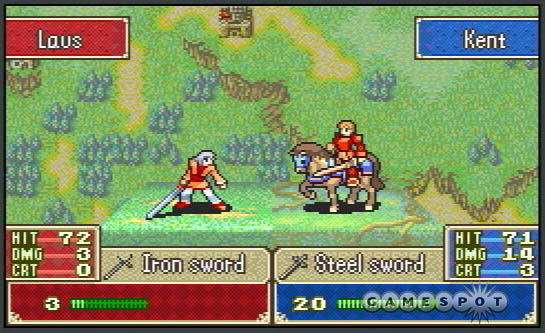
At its core, Fire Emblem is a pretty straightforward strategic role-playing game. You exchange turns with your opponent by moving about a dozen of your units into position. Then you attempt to eliminate your enemies by using weapons, which include swords, spears, axes, and bows, that are wielded by character classes such as cavaliers, mercenaries, knights, mages, archers, and clerics. A few complexities, such as physically larger characters' abilities to "rescue" other units from the field, the rock-paper-scissors-style relationship between swords, spears, and axes, the effects of different terrain, and the fact that weapons break after extended use, help make the core gameplay of Fire Emblem interesting. A great variety of excellent combat animations also makes the battles fun to watch, and after you've seen them all 20-odd hours later, you can turn them off to speed things up. While the core gameplay is what makes the game challenging and entertaining, it's not what makes the game itself so great.
One of Fire Emblem's risky design elements is that it expects you to care about its cast of characters. Each chapter of the game is bookended by some rather lengthy exchanges of dialogue (carefully and expertly translated from the original Japanese), which ultimately do a good job of both establishing the game's characters and explaining the game's rather intricate plot. The occasional use of full-screen still images punctuates some of the key points in the story, but apart from that, you'll be looking at the same talking heads during all the cutscenes. Interestingly, though the cutscenes do sometimes include action in them (and not just dialogue), the game conveys this mostly just by moving the character portraits around the screen. It's almost like a puppet show, and it's certainly not the most cinematic storytelling technique in a game--but it works. And this simple storytelling style is what allows Fire Emblem to have such an epic story in the first place.
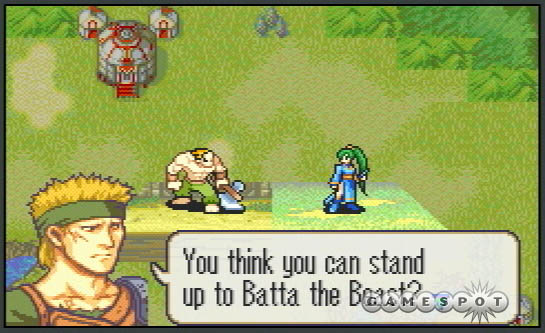
Though there isn't much in the way of animation during the game's cutscenes, each of the major characters in the game--both enemies and allies--is represented by a unique portrait and a unique textual profile. The anime-style portraits are done up in a very consistent style, and, along with the descriptive text for each character, they're like self-contained exposition. You get a great sense of each character just by looking at him or her and reading a sentence or two about him or her.
On top of that, one of the game's peripheral elements is an intricate web of inter-character relationships. Basically, the designers of the game plotted out a surprisingly complex narrative in which none of the dozens of different characters exists in a vacuum. For instance, one of the characters who may join you later on in the game happens to be the assassin of the lover of one of the other characters who's already a member of your party. Want to see them have it out and settle the score? You can. There are hundreds of unique little interpersonal conversations that may occur over the course of the game, depending on how and whether you pair up certain characters. You'll never be able to see them all by playing through the game just once, twice, or even three times.
Obvious care and attention went into Fire Emblem's story and characters. But the riskiest aspect of the game is the way in which it happily kills off its main characters. Or rather, the way in which it puts you in direct control of their fates. Obviously, the game has a structured narrative, and as such, you do need to keep the three main characters alive. But apart from them, should any of the supporting characters lose all their health points during a mission, they're gone for good, forever. There are no magical resurrection scrolls or potions in this game, so an unlucky critical hit from an opponent can knock your mightiest paladin or most experienced general out of the battle permanently. The only way to change this is to restart the chapter from scratch. In the game's epilogue, you'll learn that your fallen characters either died on the battlefield or left the company due to their grievous wounds. For all the survivors, you get a nice wrap-up of whatever happened to them.
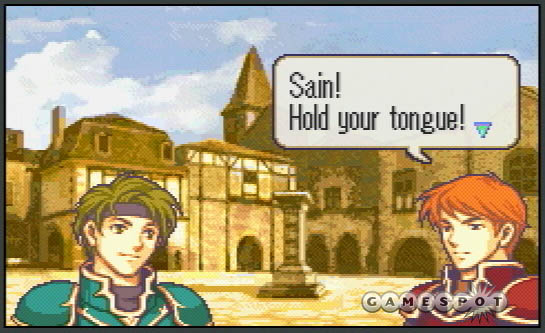
I liked Fire Emblem's characters from the start, and in the first two-thirds of the game, I didn't accept any casualties. Then it got tougher, and I had more characters than I needed. So I grudgingly took a few losses in the name of progress. However, the game's epilogue really hit me hard. I wanted to know what might have happened had these characters survived. Sure, it's all just fiction, but in a way, I did feel responsible for the deaths of some of these imaginary characters.
Upon finishing Fire Emblem, I also discovered that it presented me with the option to start the game all over again, only this time from the perspective of a different character. The focus of the story becomes slightly different, a few scenarios are changed or introduced, and the experience is just as rewarding as it is the first time. This second time around, however, I vowed to keep each and every one of my companions out of harm's way. And that's just what I did.
I finished Fire Emblem on the same day that I saw The Lord of the Rings: The Return of the King in the theater. Both are works of fantasy-themed fiction, and both tell epic stories. The difference is, in the case of Fire Emblem, it was entirely up to me as to who lived and who died. Some remarkably surprising victories and some terribly disappointing defeats occurred as a consequence of my actions during the 20 hours I spent playing through the game for the first time, and that experience is mine alone. I can't easily justify the designers' decision to include such a punitive character death system in Fire Emblem, but I realize that this is a big part of the reason why I like the game as much as I do, and it's also why I've spent so much time playing and replaying it.
| Sam Parker Editor, Official Assets |
Advance to the Past
Whatever expectations I had for my holiday break, I didn't go into it by planning to pick up a GBA SP to play dozens of hours of Advance Wars 2, but that's just what I did. It was the perfect game to have on a trip that took me halfway across the US and kept me away from my PC and consoles for nearly two weeks. Well, any GBA game could have served as a distraction on the go--but I always need one must-have game in order to buy a new game system, and naturally enough, my strategy urge just had to be satisfied. I'd heard enough about how the GBA is the new home of turn-based strategy games.
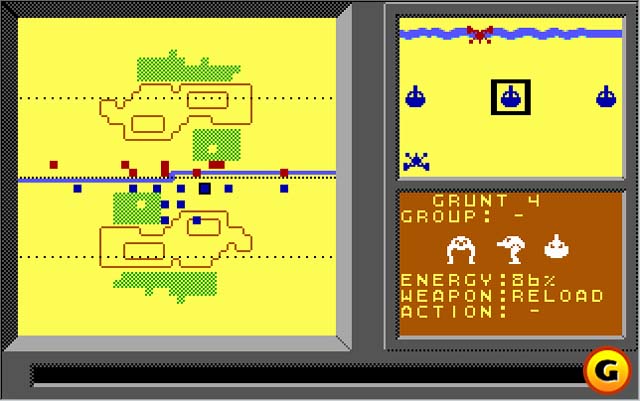
Turn-based gameplay isn't exactly disappearing from the PC. Just look at Silent Storm's new take on turn-based squad tactics or the latest incarnation of Civilizations. However, Advance Wars 2 makes me think back to some hazy PC-strategy past, when the gameplay mechanics were as pure and simple as the 2D graphics. As much as I appreciate new RTS games' intricate game balance, which packs in as many distinct units as possible into a roughly rock-paper-scissors model, it's easy to appreciate something that goes back to basics. At some point, games actually taught me about combined arms, that oh-so-elegant military theory interrelating infantry, cavalry, and artillery or air, land, and sea units. The point was easy to see in Modem Wars (a true multiplayer RTS from 1988), where there were literally just a few units to deal with. Some 15 years ago, Modem Wars had me maneuvering to entice opponents into charging my infantry units that were entrenched on hillsides--while my cavalry was waiting to flank.
With map graphics hardly more elaborate, Advance Wars 2 is a modern tactical playground, and part of the charm is simply the 20th-century theme. There are just too few PC strategy games that re-create 20th-century warfare without getting into wargame-like complexity. Recently, Empires and Rise of Nations had good air and tank warfare, but there was still too much going on to expect much tactical depth. Advance Wars 2 is better for not even alluding to whether one nation's historical guns, tanks, or planes might have been more effective or reliable than another's. The WWII grognards can get their fix of historical detail somewhere else. Simplicity is not only elegant; it also makes the gameplay faster. It's not as if chess would be a better game if the knight came in several varieties.

With that said, Blizzard has set my expectations pretty high for a story-based strategy campaign. Looking back at 2003's large crop of strategy games, there's nothing that comes close to Warcraft III: The Frozen Throne in terms of story and mission variety. If I'm going to grind through 20 or 40 hours worth of missions, there needs to be something to keep my interest after the designers have run out of new units and map gimmicks. Blizzard has somehow learned to tell a story in real-time strategy missions and to also pace a campaign well by mixing unique mission types in with more traditional fare. It's obviously something that lots of games try to do, but telling a good story seems to be the hardest thing around. Plenty of real-time strategy gamers don't even seem to bother playing single-player missions anymore, and with exciting online multiplayer to turn to, they're none the poorer. But it's hard to find (or even imagine) a turn-based multiplayer game that's fast and slick enough to please impatient gamers like me.
At some point, I started saying to myself that the world would be perfect if the GBA had wireless online features so that I could easily find Advance Wars 2 opponents. However, now that I think about it, it's just not realistic to expect a random foe to stick out a one- or two-hour match--especially on a handheld device that most people expect to pick up and put down at their own leisure. So for now, I'll just have to appreciate playing solo strategy missions anytime I want. It certainly makes the commute go by faster.
| Tyler Winegarner Associate Producer, GameSpot Live |
Keep It Simple, Keep It Fun
In my senior year of high school, I enrolled myself in the school's mechanical drawing class. At the end of every semester, the final test for the students was a unique and challenging engineering project in which you had to build a machine that would accomplish a particular task. It could be something simple, like a device that would rotate a certain number of degrees and then stop when struck by a small wrecking ball, or it could be something complex, like a device that would launch an egg so that it would land, intact, in a six-foot-wide circle that was 50 feet away from the launch point. The teacher, Mr. Roa, would happily hand these assignments out a week or two before the end of each semester, and as he watched the gears in the kids' heads grind and churn, he'd always remind them of his simple adage for success: "Keep It Simple, Stupid" (aka, the K.I.S.S. method of engineering). Of course, I'm not just reminiscing here for my own good; I'm thinking about this adage in relation to video games.
It's a given that games are getting more and more complex, and that's OK. It's cool to be able to pick up one game and to be able to do so many different things with it. If you didn't care much for the shooting aspects in Freedom Fighters, you had the strategy aspect to fall back upon, or vice versa. However, it seems that many developers approach games with a hand-grenade technique so that if they have enough broad-spanning features in a game, you're bound to like something in it. Take Splinter Cell, for instance. You're bound to like something in it, be it perhaps the shooting, the gadgets, the acrobatics, or the stealth. It's got something for almost everyone, but sometimes, what it brings to the table feels stretched a bit too thin.

On the other hand, when was the last time you met someone who didn't like Tetris? For a game that's pervasive enough that just about everyone who has ever touched a computer has played it, it seems to have racked up only a very small number of dissatisfied customers. To be liked by more people than disliked is a pretty tall order for a game, admittedly, but at the end of the day, isn't that something that all games should try to aspire to?
Most games that fall into this category of being simple but addictive tend to be, and with little surprise, puzzle games. Regrettably, the downfall of many of these games is that they all tend to feel the same. Tetris set the precedent for modern puzzle games, but it also set the trap. Ultimately, the paradigm for most puzzle games now seems to include things falling, thus forcing the user to manipulate and organize the falling objects before they hit the ground. However, there are a lot of modern games that seem to cleverly disguise their simplicity behind complexity. A lot of racing games do this by providing a steep and progressive challenge, albeit an addictive one.
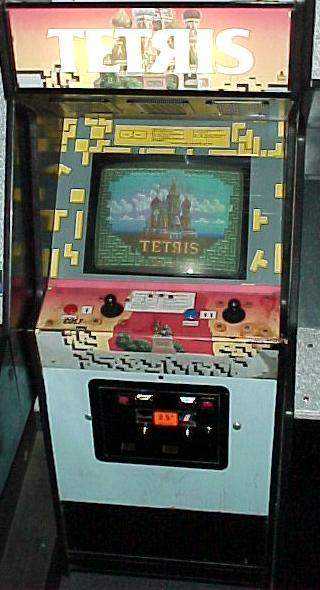
Ultimately, the key to creating lasting appeal in a game, historically, is to keep it as simple and addictive as possible because the experience never changes, and it never gets old. The experience might prevent you from achieving a certain sense of accomplishment in being able to plow through a 10-, 20-, or even 40-hour story-driven game just to see the ending cinematic and to watch the credits roll, (thus ultimately allowing you to shelve the game while gaining a sense of triumph), but it seems like the greater triumph--as a video game consumer--is to buy a game that never makes it back onto the shelf in the first place.
| Ryan MacDonald Executive Producer, GameSpot Live |
Hindsight is Always 20/20
Looking back, I'm inclined to say that 2003 wasn't the great year in gaming that I had hoped for. On the PC, we didn't get Half-Life 2 or Doom III, Star Wars Galaxies wasn't as revolutionary as it promised, and games like Max Payne 2 and Call of Duty--as good as they were--felt like more of the same. On the console side it was a similar story. Everyone got superexcited about games like Halo 2, Gran Turismo 4, and Metal Gear Solid 3, which are games that are all currently slated for a 2004 release. A ton of great games were released throughout the year, but there just wasn't that one really spectacular game that stood out above the rest.
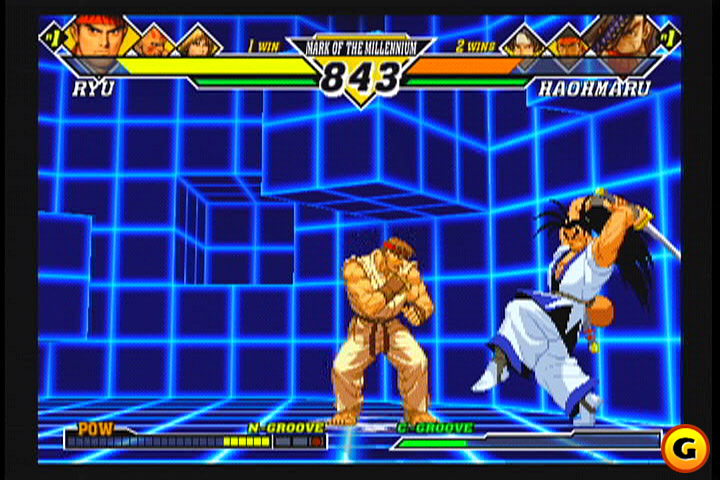
For all the disappointments, the one thing that proved true was that 2003 was indeed the break-out year for online console gaming. I probably played more ESPN NFL Football and Capcom vs. SNK 2 EO online than any other single game or games combined--well, except for maybe Counter-Strike, but that hardly counts. At the same time that consoles were coming into their own with online play, it seemed like the massively multiplayer online community stumbled a bit, with most games lacking real direction. The number of PlanetSide servers was reduced as the population of the game thinned out over time. The Sims Online had a slow start at the beginning of the year and never really captured as large of an audience as EA had hoped. Star Wars Galaxies: An Empire Divided became the second largest subscription-based game in 2003, although players began to complain that promised updates were too slow to come, and the ability to advance your character was too limited.
The one major surprise for me in 2003 wasn't a particular game, but it was the fact that I would find a new way to play console games without a television. Some of you may remember a previous article I wrote about digital projectors and the Epson PowerLite S1, the first affordable digital projector on the market. Since then I have gone from using the projector as a secondary fun way for playing my console games to the only way I play console games at home. If we had placed a section for it in our game of the year awards, I would have nominated the projector as the best gaming peripheral/display of 2003.
Although 2003 might not have been all we had hoped for, there actually were a lot of really good games. Going through our 2003 awards feature and taking a look at all of the nominees and winners, games like Prince of Persia: The Sands of Time, The Lord of the Rings: The Return of the King, Star Wars: Knights of the Old Republic, and Call of Duty show just how many good games came out in 2003.
Looking ahead at the release calendar for 2004, it certainly looks like a big year for big games that we were hoping would be released in 2003. What's really exciting are the as-of-yet unknown titles and products that we'll hear about in the coming months. What unannounced titles are in the works? Who will be the first to talk about their next-generation console? Will we even hear about them this year? What about the PSP? Will it change the way we think of portable gaming? Looking at the coming 12 months, 2004 is brimming with unanswered questions.
| Ricardo Torres Previews Editor |
2003: The Year of the RPG?
As 2004 looms before me like an enticing stack of unopened presents, I feel like I should take a minute to look at the mountain of crumpled wrapping paper stuffed in the recycle bin that was 2003. It was a quirky year that had more than a few surprises and a fair share of disappointments as well. One of the things that stood out for me--painfully so--was the deluge of console RPGs that hit last year. 2003 was an impressive reminder that RPGs are no longer just trotted out for the stereotypical fanboys and fangirls. It's downright staggering when you think back on the lean years, when we'd all be huddled around the latest Enix, Nintendo, or SquareSoft RPG, patiently waiting out the six months or the full year that it would take for another worthwhile RPG to arrive.

The RPG releases in 2003 were more akin to a flood than the fairly steady flow that we've become accustomed to in recent years. More importantly, at least for me, was the change of pace offered by the different titles. One of the criticisms leveled at the genre--familiarity and repetition--didn't apply as much to many of this year's games, thanks to some interesting gameplay and design that played with convention. Two perfect examples are Breath of Fire: Dragon Quarter and Final Fantasy X-2. The previous entries in Capcom's Breath of Fire franchise always stayed pretty true to their 16-bit roots, even when the series jumped to the PlayStation, but the PlayStation 2 game put a fresh twist on the games that somehow made seeing yet another incarnation of Nina work.
As for Final Fantasy X-2, Square's role in the growth of the RPG genre has always made it an easy target for anyone looking to criticize the Japanese developer for repeating itself. And a direct sequel to one of its most popular franchises? How could they not do it by the numbers? Well, for starters, a refined gameplay system and a liberal dose of goofiness helped the game to stand on its own.
In other cases, we were treated to some interesting twists on genres we thought we knew. Atlus' Disgaea: Hour of Darkness offered a pretty insane spin on the standard tactics game with its item-world madness, which was almost like a second game. Nintendo's Mario and Luigi: Superstar Saga took a step back to 2D and simultaneously took several steps forward to serve up a nifty adventure with modern trappings and a cracking old-school feel.
Bandai's .hack offered the novel approach of presenting four serialized installments that were spread out over the course of the year. However, there were still some excellent nods to the classic game styles that many of us cut our teeth on, such as Nintendo's Fire Emblem and Golden Sun: The Lost Age, in addition to LucasArts' Gladius.

Of course, LucasArts and Bioware's Star Wars: Knights of the Old Republic will likely stand as the most significant RPG release of 2003 for the very simple fact that it was an original game that managed to "do right" by the Star Wars license, which has been defiled several times over in the past. The game's winning mix of engaging gameplay and involving story was a powerful hook. In all likelihood, only BioWare could have pulled off such a feat.
In the end, 2003 was a great year for the industry, but it was probably a greater year for the RPG genre. The titles released last year showed the depth and maturity of a genre that's starting to grow up and develop in some promising directions. Not all of them sold as well as they should have. However, a lot of good games, even outside the RPG genre, didn't sell that well last year. But that's another column. We'll see if 2004 brings us as many entries in the genre. Still, we got plenty of gems in 2003 to satisfy just about any RPG fan's taste. So, if everything was so great, where's the pain I mentioned in the beginning, right? Well, anyone who tried to play all the good stuff last year knows the pain of trying to get through huge games like Dark Cloud 2 and Xenosaga while trying to stay on top of all the other good stuff that came out. It ain't pretty, people, but at least it's the good kind of hurt.
| Jeff Gerstmann Senior Editor |
Zo-Zo-Zo-Zodiac Siiiign
I've been messing around with the Tapwave Zodiac a lot lately. Originally, the system seemed like a really great idea. I had already been thinking about getting a PDA, and if I could get one that played decent games, then everybody wins, right? Unfortunately, right now, the "decent games" bit is where the Zodiac falls apart. I've been spending most of my time with the unit playing solitaire. AcidSolitaire, to be exact, which comes with the unit. I tried getting into Spy Hunter and Stuntcar Extreme, but they're really only marginally better than N-Gage games, which is to say that they're mostly unplayable. And the Zodiac games on the horizon aren't exactly mind-blowing, either. Do we really need yet another port of Doom II? No thanks.
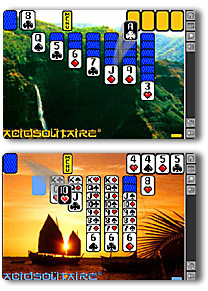
It's the more conventional Palm stuff that had me excited. There are a billion PalmOS games already out there that would probably run just fine on the Zodiac, plus I figured the PDA features would come in handy for, like, keeping my life together. However, after spending some time updating my contacts and scheduling in some appointments, I came to a couple of different realizations. First, my cell phone--a Danger Hiptop, to be exact--is much better at keeping contacts in order than a PDA will ever be. Considering I can already make calls and send e-mail from my phone, storing these details elsewhere is a pretty worthless bonus. Second, apparently my life doesn't contain quite enough jet-setting, fast-track excitement to warrant something that keeps my appointments in line. So far, the only thing I have scheduled is "pay your credit card bill on time this month, you idiot." Hopefully, this'll work.
The other thing I did during our downtime was reintroduce myself to Dance Dance Revolution. I used to play the game nonstop, but I haven't really played much as of late, with the exception of having played a bunch of DDR Ultramix for our recent review. During the break, when I was working hard on doing as little as possible, I got re-obsessed with DDR. I was probably playing it for two or three hours a day. I mostly stuck with 3rd Mix, but I jumped around and played some MAX 2, some Ultramix, and a few others, too. I'm reasonably good at the game, but I'm definitely no expert, and I don't play with a lot of style. It's safe to say that you'll probably never catch me doing some stupid cosplay-themed dance routine to Butterfly at your local mall. I only dress up like an anime lady in the comfort and privacy of my own home. Wait. Forget I said that last part.
Our little holiday break comes as the game industry winds down and prepares for another year of exciting releases. Personally, I think 2003 wasn't really a great year for games. It was a great year for delays, though. 2004 will see the release of all those delayed games, as well as a whole mess of new stuff. Personally, I'm still looking forward to Half-Life 2, but that's a pretty obvious choice, as is Halo 2. Beyond that, I'm hoping that X-Men: Legends turns out to be as totally rad as it looked back at E3 last year. I'm not a fan of the X-Men, but that game looked like it could turn out to be pretty amazing. I'm also looking forward to seeing what Rockstar does with The Warriors. That was a great movie, and it's just dying to be made into some sort of beat-'em-up or something. Midway will also release a new Mortal Kombat game at some point this year (signs currently point to October). Hopefully it'll have online play. All fighting games should really have online play at this point. A genre so focused on competition really needs that.
So that's what's been on my mind over the last few weeks. Well, that and actor/comedian Barry Sobel. It's a new year, and it's time to wipe the slate clean and start thinking about a whole new collection of game releases. Personally, I'm pretty excited.
| Jason Ocampo Associate Editor |
The Truth Is a Few Years Too Late
I was a huge fan of The X-Files before it exploded into the hip, pop culture television smash of the '90s. With its brilliant premise and smart writing, which followed the adventures of FBI agents Fox Mulder and Dana Scully, the series truly represented television at its finest--at least for the first five seasons.
Unfortunately, the same couldn't be said of The X-Files Game, which came out in 1998. A by-product of the Silliwood era when Hollywood and publishers believed that watching full-motion video (FMV) constituted thrilling gameplay, The X-Files Game was a gigantic disappointment. Instead of playing Mulder and Scully, you played an FBI field agent who was attempting to track down the missing Mulder and Scully. The show's two main characters are barely in the game at all. Talk about developers missing the point entirely. What little interactivity there was in the game was poorly done, and you spent most of the time watching grainy FMV. About the only highlight for me was recognizing all the locales, since the game was filmed in my hometown of Seattle. Aside from that, the game was a totally forgettable experience.

The television show went into a slow decline after season five and the motion picture. This was mainly because the people involved couldn't say no to the truckloads of money Fox Studios threw at them to keep the show on the air long after they should have wrapped things up. Things really went downhill after David Duchovny took off, bored of his role. Then the alien-based mythology storyline became so convoluted that it bordered on ridiculous. By the time The X-Files finally went off the air on May 19, 2002, it felt like a mercy killing.
So it's a bit weird to realize that there's a new X-Files game scheduled to come out next month, almost two years after the TV show wrapped up. The X-Files: Resist or Serve is an adventure game set during the show's seventh season, when David Duchovny was still around. It's supposed to pack about three episodes worth of original content and is to feature Duchovny and Gillian Anderson voicing their actual characters. And this time, you actually get to play as Mulder and Scully. On paper, it sounds like the game that we should have gotten way back in 1998.
But the jaded part of me has to wonder whether this game is even necessary. First of all, there's the backlash against the need to turn everything into a merchandising opportunity. Granted, there's already been one X-Files game, but at least that came out when the show was still in production. The show's been dead for two years, and you can only catch the reruns late at night (here in San Francisco). Second, I can just imagine the committee meeting in which the game came about:
Suit #1: "So what's popular with kids?"
Suit #2: "Well, there are these Resident Evil games my kids play."
Suit #1: "Really? What are they about?"
Suit #2: "You explore creepy places and shoot zombies."
Suit #1: "Hmmmm. What brand do we have that's similar?"
Suit #2: "Well, there's The X-Files. They've done zombies before. And they're FBI agents, so they have guns."
Suit #1: "Cha-ching!"
Sure, it's a cynical view of the world, but when virtually every Hollywood movie these days comes out with an accompanying (and usually lame) video game, it's easy to get jaded about such things.
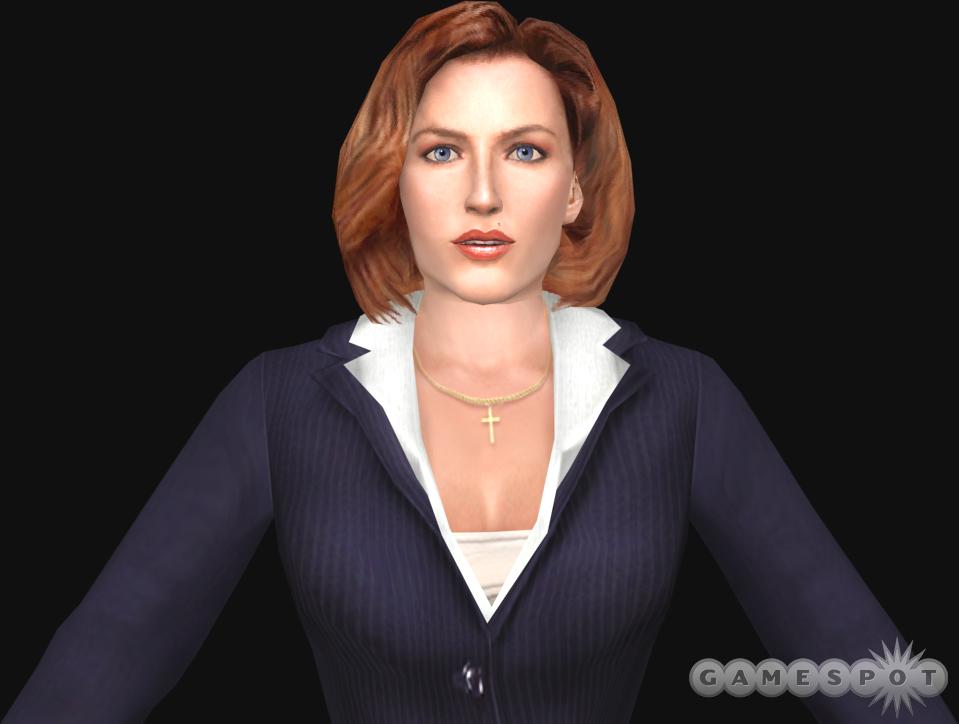
However, the most galling thing to me is the fact that Resist or Serve is coming out on the Xbox and the PS2 but not the PC. The TV show flourished thanks to rabid Internet-based fans, dubbed X-Philes. Years before the Internet went mainstream and commercial, there were dozens and dozens of X-Files fan sites fueling the show's popularity. X-Philes were so influential that the show's creators thanked them by figuring out ways of naming them in episodes. The PC is the natural medium for an X-Files game. Yet, nothing has been announced about a PC version of Resist or Serve. I imagine that if the game sells well there could eventually be a port to the PC, but this is hardly the way to treat the show's staunchest fans.
In the end, though, I know I'll play Resist or Serve on my Xbox. And I do hope it turns out to be a good game. X-Files fans deserve no less, especially after that deeply disappointing series finale.
| Chris Corciega GuestSpotter |
The Queue
I anticipate the next time I'll be purchasing a new console will be about, oh, probably December 2006. "2006?!" you say. "That's, like, a bajillion years away!" Consider that my most modern console is a Dreamcast, and you may find my position downright incredulous. But this isn't a matter of not wanting or being unable to afford a new console. I simply have too many old games to get through.
I have a little text document that I typed up one day that I affectionately call "The Queue." The Queue lists what games I will be playing next and in what order. A little obsessive compulsive, yes, but never mind that. Right now, Warcraft III stands at the top of the list, and at the bottom, 15 games later, is Final Fantasy VII. I have never before needed to keep such a list, but two factors have contributed to its necessity: time and money. These probably contribute to a lot of other necessities, but never mind that.

When I was a kid, I had no Queue. In fact, I would I finish my games faster than they came in. This was mostly due to the fact that I had two months of summer vacation where I could play games 24/7. Additionally, as a kid, new games come along either on your birthday or at Christmas. Having a job was as foreign a concept to me as trigonometry. Once I reached the university, I got my first part-time job, which meant I could spring for my own games. But employment proved to be a double-edged sword, as I was no longer able to spend my summers glued in front of the TV. And so, slowly but surely, while the number of incoming games increased, the time I had to play them began to dwindle as the essays piled up. Eventually, I stopped buying games altogether, simply because of the schoolwork. And a lot of great games passed me by.

Back to present day. I'm out of school, have a lot more revenue, and a new generation of consoles are on the streets. I stepped back into the video game store after a long hiatus, eager to buy some new games. As I strolled through the store, I came upon the older games and found myself, mouth agape, staring at rows and rows of great games that passed me by while I was in school. They were now at dirt cheap, bargain basement prices! Being the impulse buyer that I am, I bought a healthy armload of games and instantly created a gaming backlog. The fact that the majority of these games were RPGs only made this backlog that much more daunting. eBay exacerbated things further with its abundant offerings of rare and ultrarare games.
You may be saying to yourself, "Forget all those old games! You're missing out on some really great new games!" This may be true, but I'm sticking to my guns for two reasons. Firstly, the damage has already been done. I already own all of these games, and many of them are still shrink-wrapped, so I might as well play them! Secondly, there are some truly great older games out there, so it would be wrong if I didn't play them! It's akin to having never seen Star Wars and having people come up to you and say, "What?! You've never seen Star Wars before?!" There are many Star Wars-caliber games to play. So here I am, stuck with my little list, trying to claw my way to the bottom. I'm determined, so it's not a question of if I finish my list but when. 2006 may not be quite as far away as it seems.
Got a news tip or want to contact us directly? Email news@gamespot.com
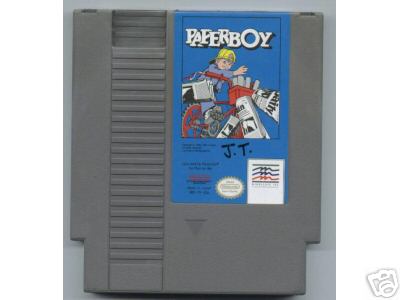

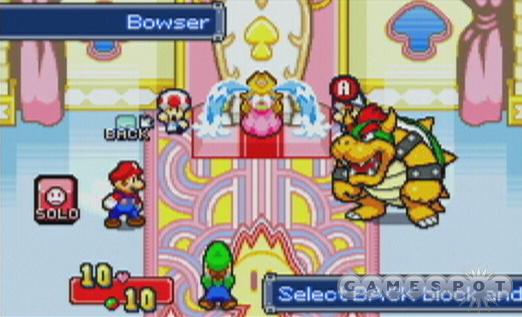
Join the conversation